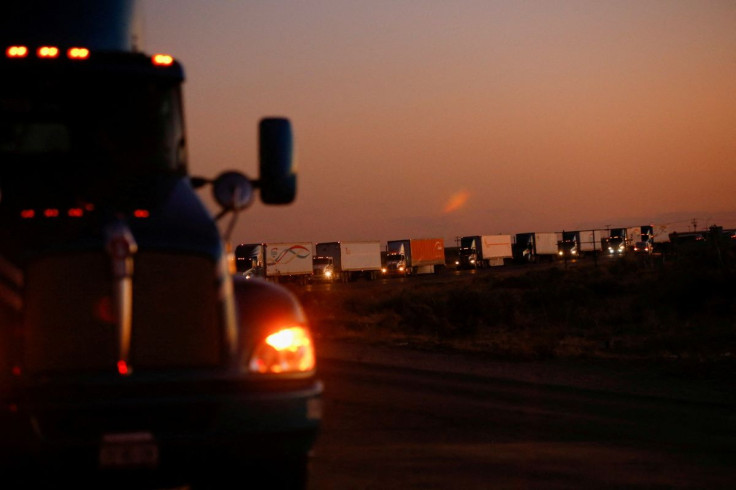Texas Governor Strikes Deal With Mexican State Expected To Ease Truck Traffic Jams

Texas will halt enhanced inspections of trucks arriving from Mexico after reaching an agreement with the last of four neighboring Mexican states, Governor Greg Abbott said on Friday, a move expected to alleviate costly, long backups over the past week.
The agreement calls for the Mexican state of Tamaulipas -- located on the easternmost part of the Texas-Mexico border -- to increase security efforts targeting illegal immigration and drug smuggling, Abbott and Tamaulipas Governor Francisco Garcia Cabeza de Vaca said during a news conference in Weslaco, Texas, near the U.S.-Mexico border.
Last week, Abbott, a Republican running for reelection in November, ordered state authorities to conduct "enhanced safety inspections" of vehicles as they cross from Mexico into Texas in order to uncover smuggling of people and contraband.
The stepped-up inspections, which Abbott said were needed because of President Joe Biden's inability to secure the border, snarled truck traffic and sparked protests by Mexican truckers in their country that shut down several commercial crossings in Texas and New Mexico.
The traffic jams caused millions of dollars in losses and prompted pressure from business groups, including the Fresh Produce Association of the Americas, an alliance of more than 100 companies involved in the import and distribution of Mexican produce in the United States.
Texas Agriculture Commissioner Sid Miller, a fellow Republican, urged Abbott on Tuesday to end the additional truck checks, saying they would "quickly lead to $2.00 lemons, $5.00 avocados and worse."
On Wednesday, the White House slammed the inspections, saying they were unnecessary and had disrupted food and automobile supply chains, driving up prices. Biden, a Democrat, is already battling rising inflation and challenges to the movement of goods stemming from the COVID-19 pandemic.
Abbott has also chartered buses to carry migrants from Texas to Washington to send a message to Biden, with the third bus arriving on Friday, according to the governor's office and news reports.
The Texas governor said at Friday's news conference that he could reinstate the truck inspections if the four Mexican states fail to take steps to reduce illegal immigration, even if resulting border backups lead to "knock-on economic effects."
Abbott and Steve McCraw, director of the Texas Department of Public Safety (DPS), said they found no smuggling attempts during the beefed-up inspections, which followed screening for smuggling and contraband by U.S. Customs and Border Protection officers.
McCraw said the Texas state inspections persuaded Mexican drug cartels not to engage in smuggling, but did not provide direct evidence for that assessment.
"The cartels know what they're doing," he said.
As of Thursday, Texas DPS had taken more than 1,400 vehicles out of service for safety violations such as defective brakes, tires and lighting, the agency said.
Earlier in the week, Beto O'Rourke, a Democrat challenging Abbott in the Nov. 8 elections and a former U.S. congressman, criticized Abbott in tweets and videos, calling the governor's actions a "political stunt" that sowed chaos at the border.
Abbott had struck similar deals in recent days with the governors of the three other Mexican states that share a border with Texas -- Nuevo Leon, Chihuahua and Coahuila -- amid pressure from business groups.
© Copyright Thomson Reuters 2024. All rights reserved.





















